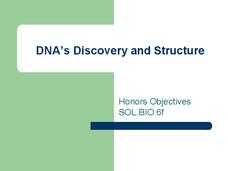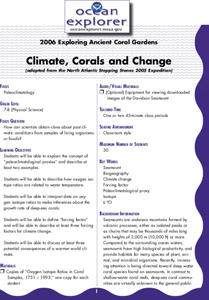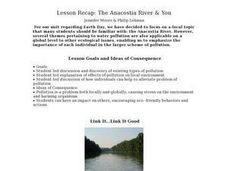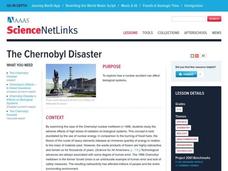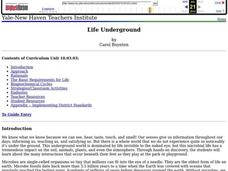Curated OER
The Discovery of Photosynthesis
Learners explore how scientists discover photosynthesis. In this biology lesson, students identify the basic requirements for photosynthesis to happen. They recreate past scientists' experiments and record their observations.
Curated OER
Human Evolution: Biology, Bones
Learners will love a weeks worth of bone study. They use bones and characteristics of bones to explore the evolution of hominoids. Bones are compared, categorized, and considered. A great way to bring physical anthropology and material...
Curated OER
Integrating Biology-Serendipity and Science
In this science and serendipity worksheet, students read about how Fleming discovered Penicillin by accident when observing bacteria that didn't grow where mold existed. Students answer questions about scientific discoveries.
ARKive
Biodiversity and Evolution
Why is diversity in biology so important for an ecosystem? Explore biodiversity, evolution, and natural selection with a presentation for your biology class. It features clear information, activities for further understanding, and...
Curated OER
DNA's Discovery and Structure
With a professional appearance, this presentation introduces advanced biology learners to the history and structure of the DNA molecule. The details included in this resource are definitely more in-depth than what you would expose a...
ARKive
Species Discovery
How do you classify a newly discovered species? Learners view a presentation and complete research about biodiversity and the classification hierarchy. The lesson includes activities with dichotomous keys and work on classifying both...
Curated OER
Bill Nye - Genetics
In this biology worksheet, students identify the different discoveries and genetics to complete 12 short answer questions related to the topic.
Curated OER
What's for Dinner?
View a video presentation comparing chemosynthesis to photosynthesis. Review the findings of the 2004 Ring of Fire Expedition that studied biological communities around the hydrothermal vents of the Mariana Arc. In collaborative groups,...
Howard Hughes Medical Institute
Gorongosa: Making Observations Activity
Do you have young scientists wanting to make new discoveries rather than just completing the same experiments? Young scientists use their observational skills to identify animals and patterns in animal behavior. Through tracking...
Biology Junction
DNA and Replication
Enzymes proofread DNA, reducing the error rate to one in one billion base pairs. Learn about the important process and so much more with the help of a presentation. It opens with the history of DNA and the major scientific contributions...
NOAA
Climate, Corals and Change
Global warming isn't just an issue on land; deep ocean waters are also showing troubling signs. Young scientists learn more about deep water corals and the many recent discoveries researchers have made. Then they examine data related to...
Curated OER
Mapping the Human Genome
Young scholars study DNA and how it was discovered. In this biology lesson students see the effects of mapping the human genome would have.
Virginia Department of Education
Cell Parts
What do a bird, an egg, a rabbit, and a toad all have in common? This fun-filled resource explains the similarities and differences between cells and how all cells are similar, yet all are different. Learners begin by depicting a...
Curated OER
Kingdom Animalia ~ A Look at the Five Major Classes
Biological taxonomy masters examine the five main classes under phylum chordata. Pupils compare and contrast the identifying characteristics of the various organisms. They explain why taxonomy is important in classifying organisms. You...
Curated OER
Lesson Recap: The Anacostia River & You - Biology Teaching Thesis
Seventh graders give examples of local sources of pollution and postulate reasons as to why local sources of pollution can harm the ecosystem. They address the following question in short answer form: "Why is litter/chemical pollution...
Howard Hughes Medical Institute
Discovering the Wallace Line
When studying locations of specific species, interesting patterns emerge. Young scholars discover this as they plot the location of specific species on a group of islands. Patterns emerge as they identify the Wallace Line. They then...
University of Minnesota
Ethics of Dissection
There's an elephant in your classroom. That's right — a big, awkward elephant named Dissection. Sure, you'd like to talk about him ... but how? Whether you're a seasoned teacher or fresh out of student teaching, the topic of dissection...
Virginia Department of Education
Current Applications in Science
High schoolers may claim to have no interest in scientific revelations and discoveries, but watch how quickly they download a new app onto their state-of-the-art smartphones. Scholars discuss the scientific or technological breakthrough...
Curated OER
A Mendel Seminar
Students analyze Gregor Mendel's discovery of a process of biological evolution. They also explore how recessive and dominant traits are passed from one generation of living organisms to the next. This lesson involves environment...
Curated OER
Exploring Explorations-Ocean Exploration
Students learn about Earth's deep ocean discoveries and their benefits. In this ocean exploration lesson, students review previous explorations of the Earth's deep oceans and learn about the discoveries of the past.
Curated OER
THE CHERNOBYL DISASTER
High schoolers explore how a nuclear accident can affect biological systems. They examine the case of the Chernobyl nuclear meltdown in 1986.
Curated OER
Life Underground
First graders build a terrarium in order to observe animal and plant life dynamics. In this biology lesson, 1st graders compare how organisms survive in different environments. They write their observations and analysis in their journal.
Curated OER
Introduction to Biology
Students study cell theory and the link between it and technology. In this cell theory lesson students examine the importance of cell theory.
NOAA
Importance of Deep-Sea Ecosystems – What Killed the Seeds?
Most drugs used today come from nature, so the discovery of new ecosystems in the deep sea is exciting from a medical perspective. Scholars develop their own bioassay to test germination rates in seeds.






